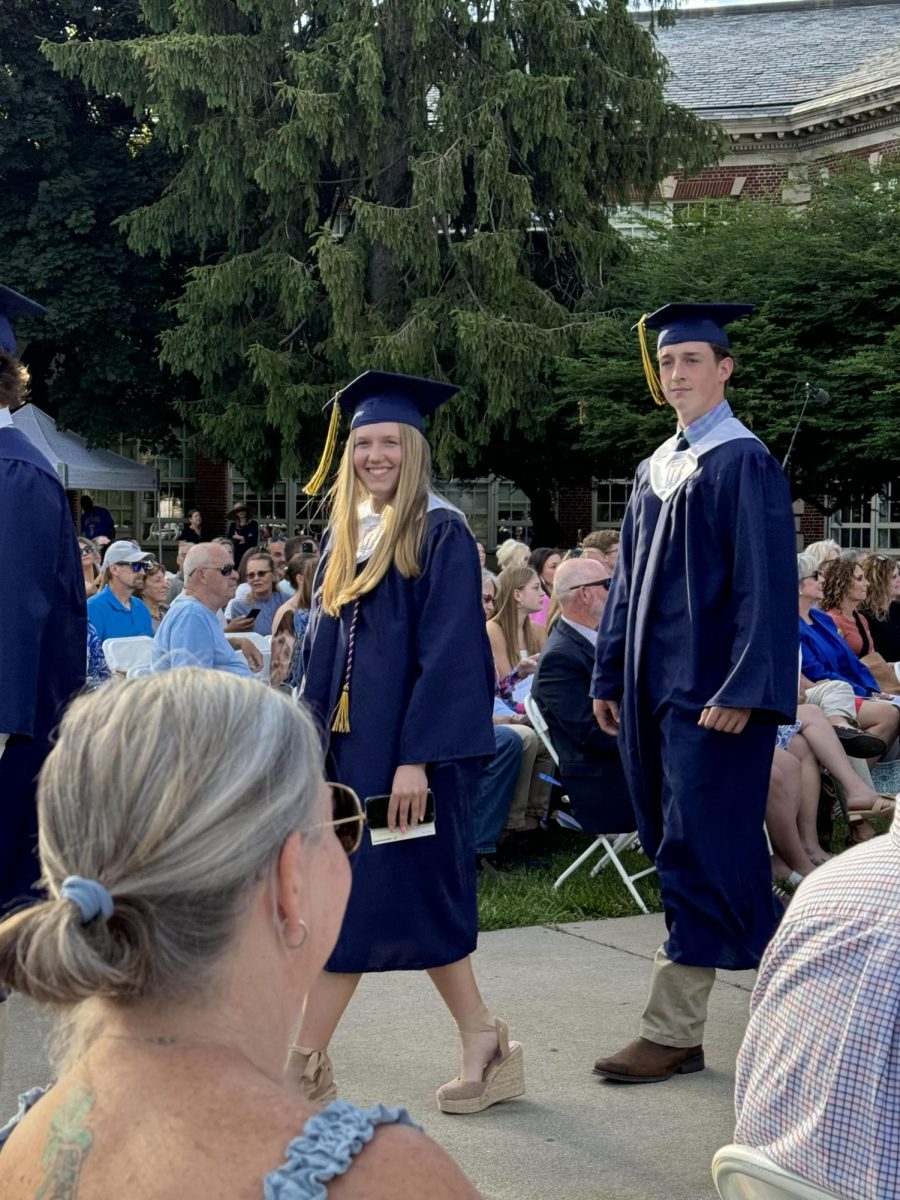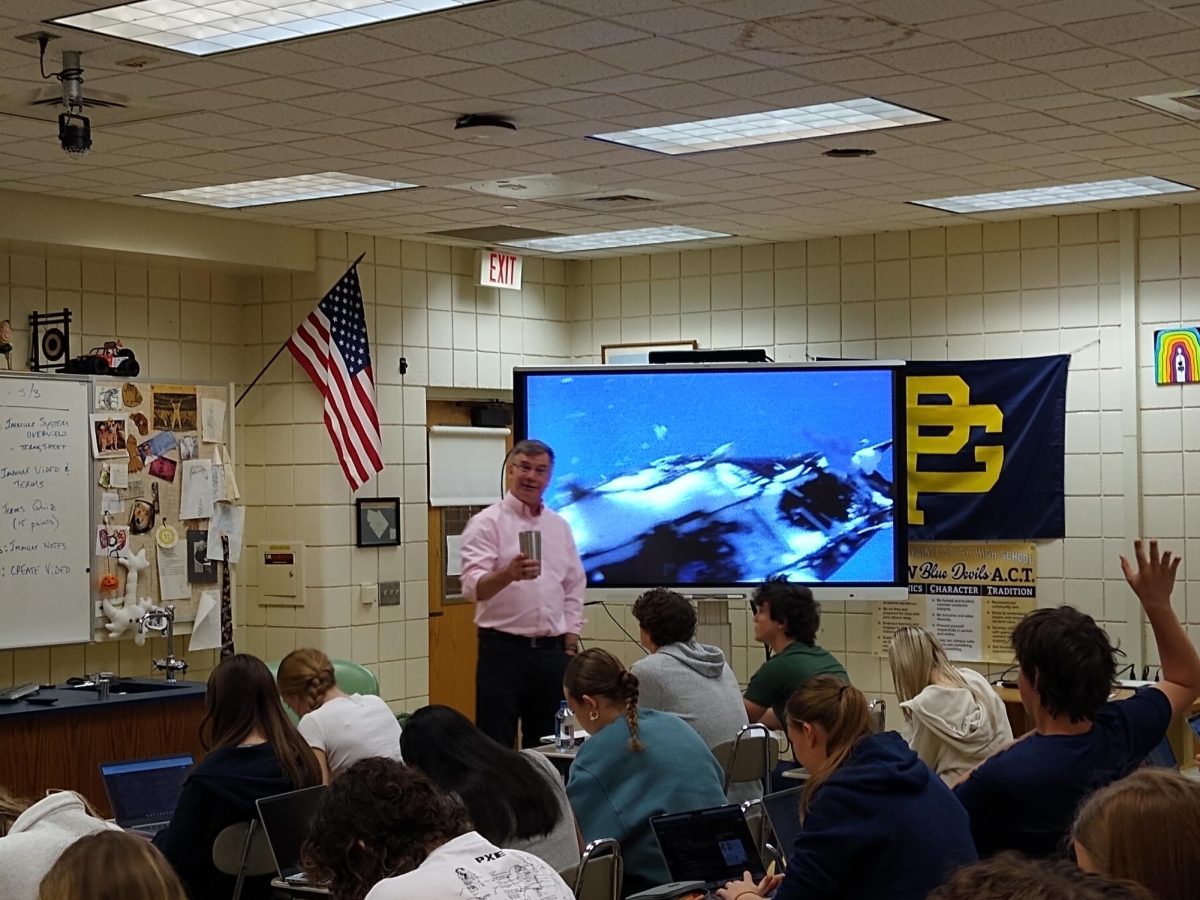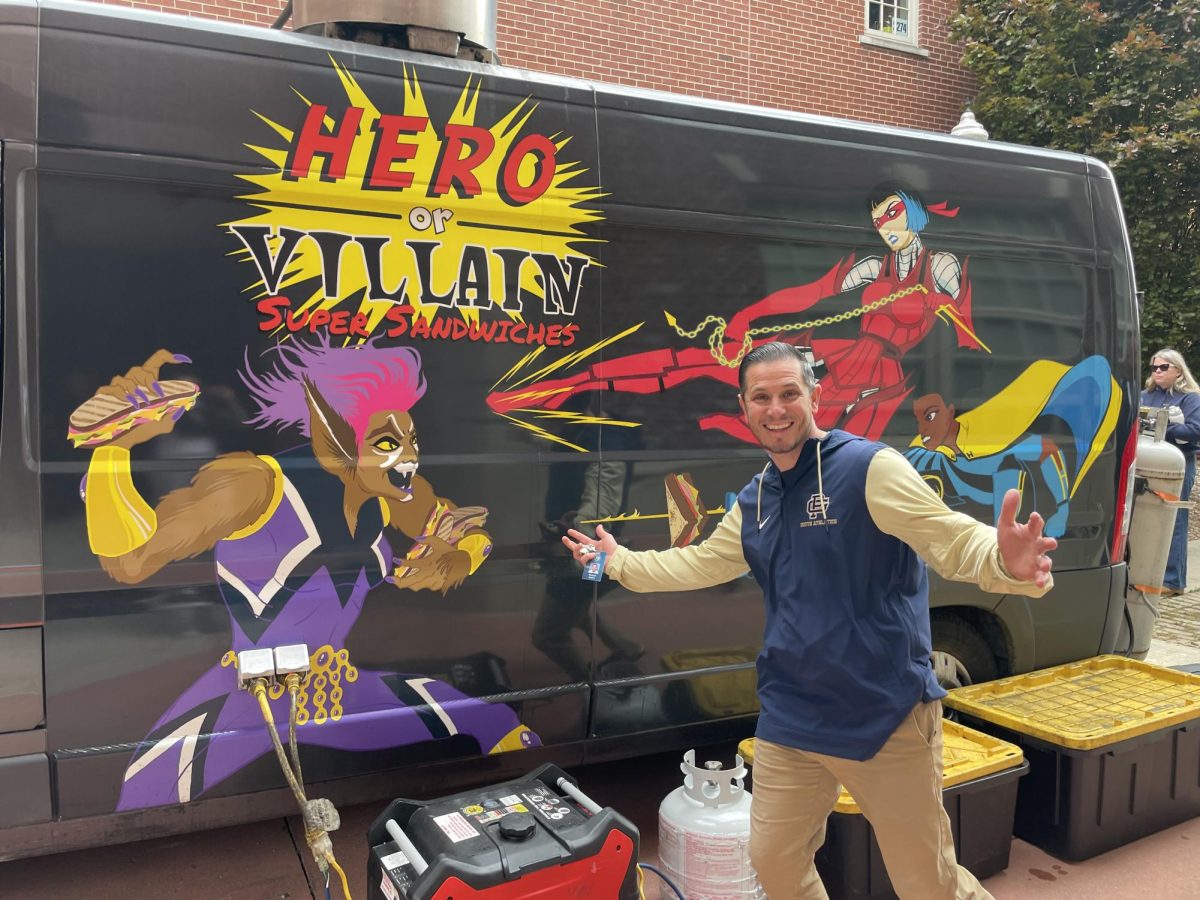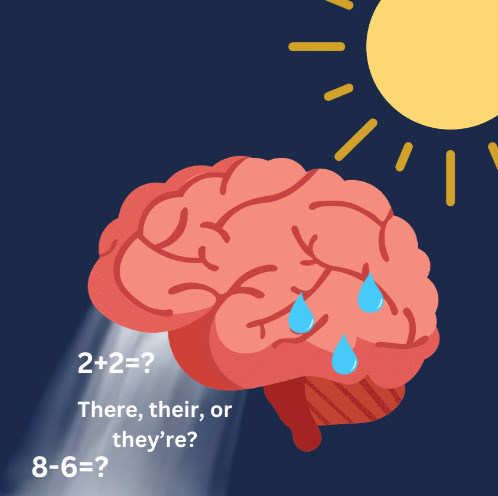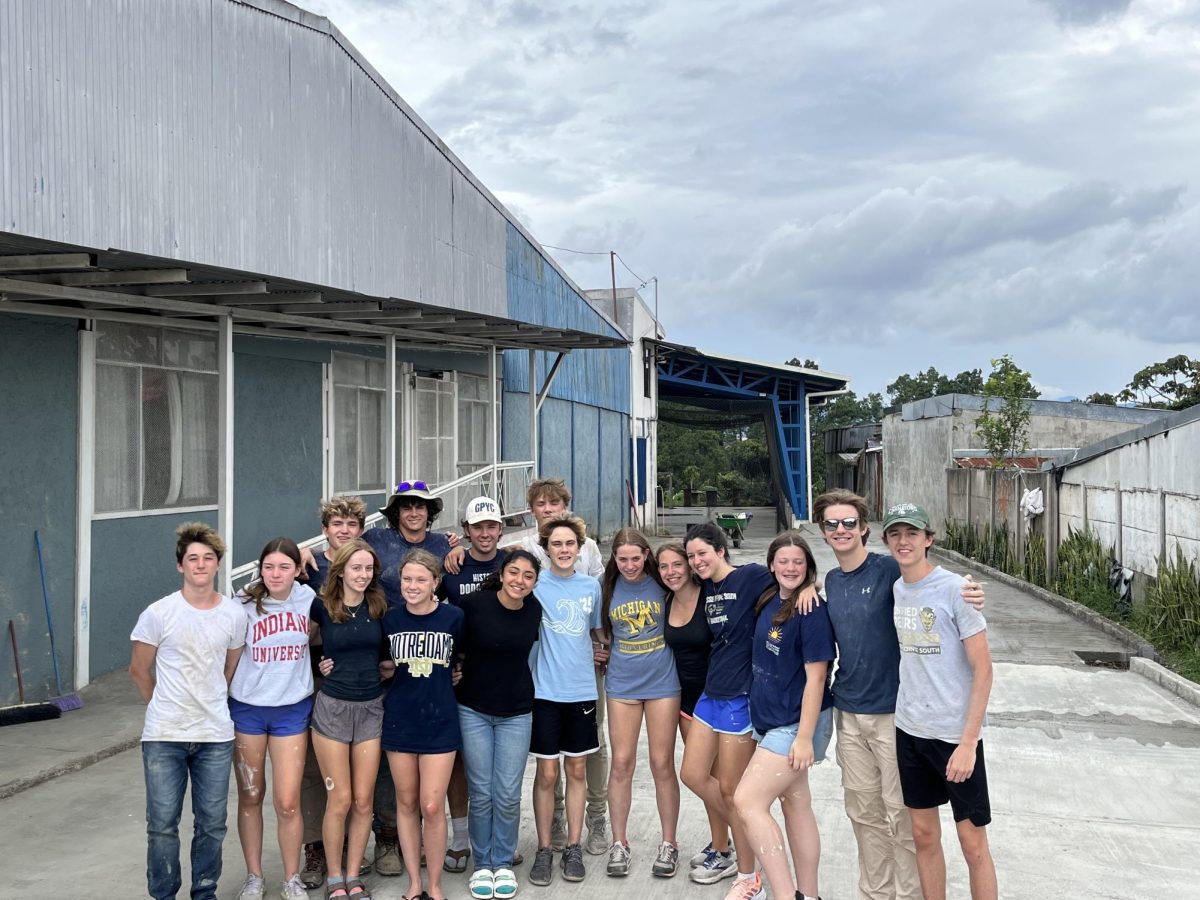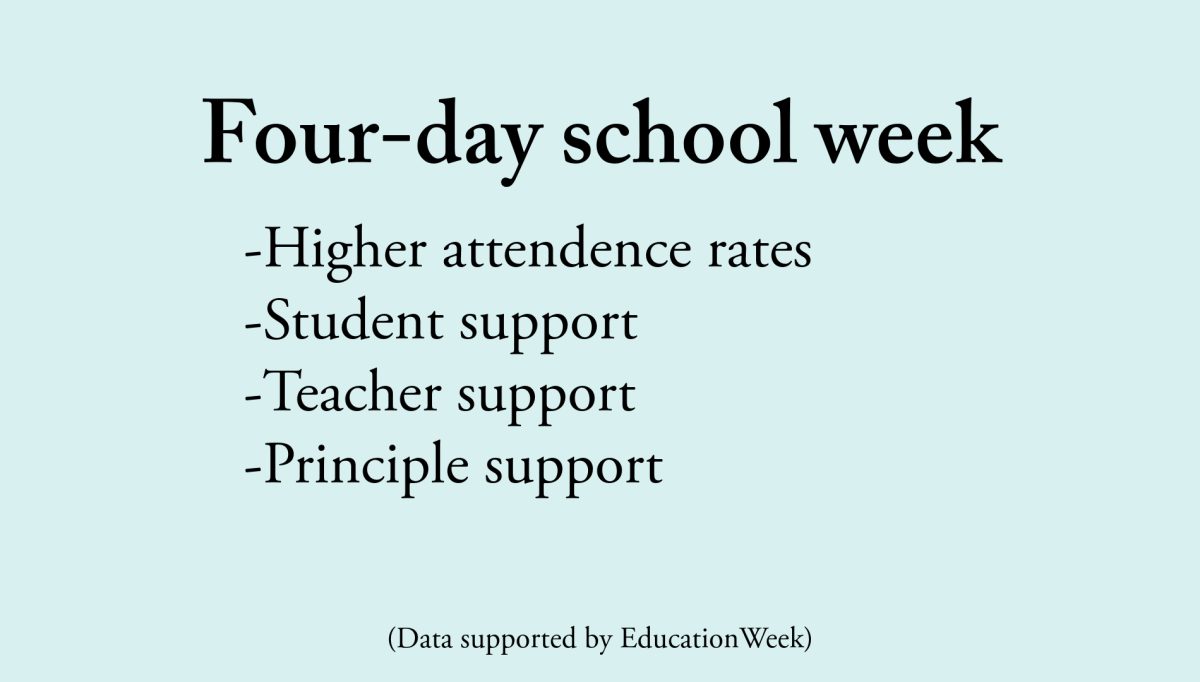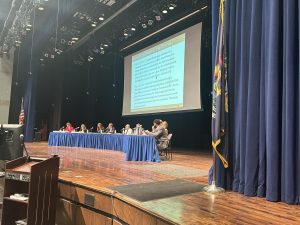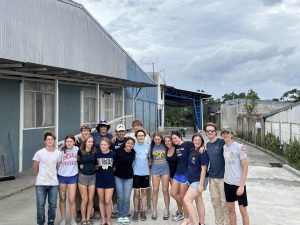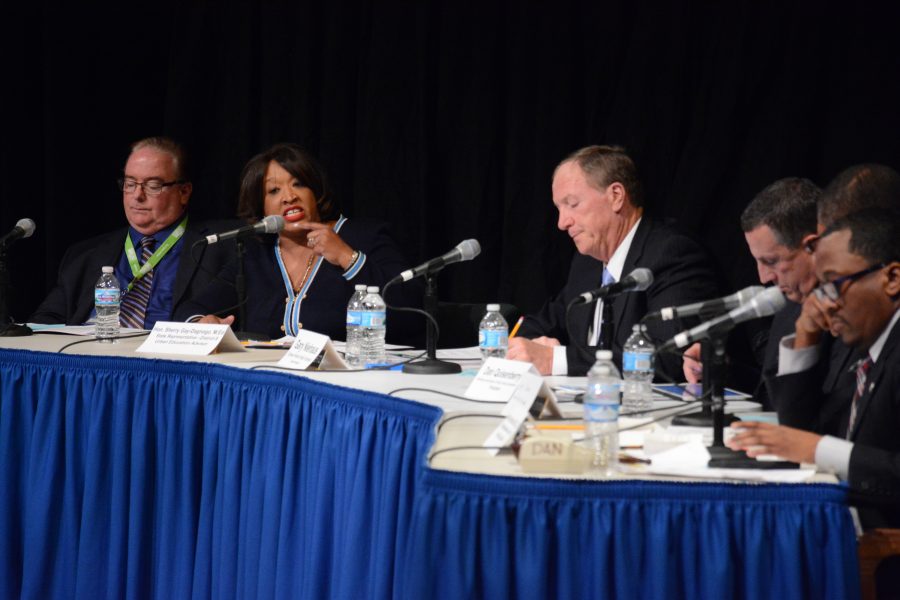By Lauren Pankin ’16 | Supervising Editor
Held on the same day Detroit Public School (DPS) teachers launched a sick-out resulting in the closures of 62 schools, the first State of Education in Michigan Town Hall was hosted and moderated by State Representative Brian Banks at Grosse Pointe North High School on Monday, Jan. 11.
“This is the first time we’ve had a panel of this diversity,” Banks said.
Consisting of state superintendent Brian Whiston, state representatives Amanda Price and Sherry Gay-Dagnogo, Harper Woods superintendent Todd Biederwolf, President Dan Quisenberry of the Michigan Association of Public Schools Academies, the bipartisan panel included Grosse Pointe-based resident and former mayoral press secretary Greg Bowens, Grosse Pointe Public School System (GPPSS) superintendent Gary Niehaus and Parcells science teacher and Grosse Pointe Education Association (GPEA) representative Christine Geerer.
Debating topics ranging from state-run Education Achievement Authority (EAA) schools to the increasing competition of cyber schooling, the town hall panelists were both applauded and booed by an audience of more than 75, consisting of DPS parents, Grosse Pointe school board members, teachers, superintendents, attorneys and congressional staffs.
New Science Standards
The first question addressed Next Generation Science Standards (NGSS), which were passed into law in November 2015, Banks said. These standards will not only address science content, but also application of skills and integration of engineering practices and design into the curriculum.
Working with Michigan Technological University and a $5 million grant, Geerer said she spent the summer writing the NGSS and reformulating middle school science curriculum to meet these standards.
“One of the biggest challenges is going to be to not fall back on doing what we’ve always done and just tweaking things a little bit,” Geerer said. “We have to start from ground level and change how we think about teaching science.”
While changes in the curriculum require teacher training, a time and money-intensive process, Niehaus said he thinks GPPSS staff will be able to learn due to an abundance of late-start Mondays and professional learning days.
“Time for us is not as big of a factor as money,” Niehaus said. “When we look at textbooks and new techniques and science equipment that is going to be needed inside the classroom, that’s going to be expensive, but it’s also going to be a priority.”
Niehaus also stressed the importance of ensuring the science curriculum prepares students for the ACT and SAT.
Also a superintendent, Biederwolf said he seconded Niehaus’ opinion, since science is the domain with the strongest career connections. He added that the transition will be a process, not an event.
“It’s the transition from asking our students to understand science to asking our students to do science in a way that requires some original thought for them to contribute to that concept of innovation,” Biederwolf said.
As the state superintendent, Whiston said these standards were called for by teachers and drafted with the support and direction of educators and experts. Providing professional development is the responsibility of the individual district, he said, regardless of cost.
“Of course, the money and time isn’t there. We never make this easy, right?” Whiston said. “But we go through process of updating standards on regular cycle basis.”
Charter schools are expected to meet the NGSS, Quisenberry said. They experience the same struggles with budgets and implementation, although entire charter schools can be created around a STEM focus.
New Rules for Teacher Evaluations
Also in Nov. 2015, Gov. Rick Snyder signed Senate Bill 113 into law, which created new rules for teacher evaluation, Banks said. The bill reduces the weight of student test scores and allows districts flexibility in choosing their own evaluation tools.
For the next three years, student growth calculations will account for 25 percent of a teacher’s evaluation, a percentage which will rise to 40 percent in the 2018-2019 academic year and beyond, Banks said. Standardized test scores will represent half of the evaluation, and the remainder will rest on local measures and assessments.
While Quisenberry said he supports the freedom of choice afforded by district-personalized assessment, Banks pointed out that teachers in DPS with 45 to 50 students in a class are subjected to a largely uniform evaluation that does not factor in poverty.
As a former DPS science teacher, Gay-Dagnogo said that while great teachers do not shy away from evaluations, the current system is unfair.
“We have to look at the fact that not all schools are created equal,” Gay-Dagnogo said. “It’s great to be here in Grosse Pointe North High School, but we would like to see all schools have a building and edifice like this, technology such as this, and for all schools to have manageable classrooms.”
Gay-Dagnogo specifically cited a lack of access to working technology, such as Wi-Fi, as a clear disadvantage to underfunded urban school districts, like DPS.
“I don’t want the narrative to be that testing or evaluating is not fair,” Gay-Dagnogo said, to applause. “But if we’re not on an equal playing field, then it’s not fair. That is what we as educators are calling for: an equal playing field.”
Calling for the abolishment of test scores as a portion of teacher evaluations, Geerer said including them does not add up.
“As a science teacher, I understand the influence of uncontrolled variables,” Geerer said. “And as a math teacher, I understand some statistics. And I have to tell you that including test scores in teacher evaluations is not supportable scientifically or mathematically.”
Geerer said the federal Every Student Succeeds Act passed in Dec. 2015 dropped the requirement for student test scores in the composition of teacher evaluations, and that she is sorry that Michigan passed Bill 113 with test scores included.
Although Price said teacher evaluations are a means of pinpointing strengths and not a method of penalizing teachers, Geerer said this is untrue since Michigan law now requires staff layoffs based on evaluation results.
“They’ve taken that formative ‘we just want to help you get better’ model and made it a ‘we’re going to tally it up at the end of the year; we’re going to rank and sort and some of you are going to lose your jobs’ model,” Geerer said. “So we’ve changed the whole tenor of the conversation. It’s nice to say it’s about growth and improvement, but at the end of the day, everyone really just wants to keep their job.”
However, Gay-Dagnogo said that this legislation is encouraging because it included teacher voice for the first time. Biederwolf said it is possible to find a fair, transferrable model to balance discrepancies across districts, within districts and even within a school, such as in the case of evaluating an Honors-level teacher versus a special education teacher.
Defending the bill, Price said it was formulating over a three-year period, involving many teachers and extensive research and testimony.
“When it did finally pass, I believe there was a sigh of relief that it was finally done,” Price said.
As an alternative to the Michigan Student Test of Educational Progress (M-STEP), Niehaus suggested the Northwest Evaluation Association (NWEA), since he said it is well-researched, is not continually rewritten, and is a better growth standard for year-to-year comparison.
Open Borders and School of Choice
Open borders, an idea floated by Snyder, Banks said, was the third discussion topic. In this scenario, every school would be mandated to allow students from any district–offering complete choice for the parents.
While Whiston does not think the idea will be implemented, he said it does reinforce that relative equality of funding is necessary to provide all students with an acceptable education.
“Doesn’t matter if you cross the street or cross the state, our students should be worth the same amount of money,” Whiston said.
Price said she agreed, since parents identify with their school district more than their country or region.
“More than anything, you don’t identify by the unit of government you live in, but by the school district your children attend,” Price said. “I think there is ownership to that, and I don’t think that’ll go away. I could see, maybe 10-15 years, maybe county-wide school districts done for cost-savings, but that is so far out of the loop that I don’t think it’s going to have lights for a long time.”
Under the current choice system, Niehaus said he does not foresee the GPPSS transitioning from a closed to an open border district. However, he appreciates the current freedom, which allows the community to vote on the decision.
In Detroit, although the district has open borders, the system of choice is biased because there are few quality schools from which to choose, Gay-Dagnogo said. She believes that the 2011 removal of a cap on the number of urban charter schools has been rampantly abused, and that the concept of neighborhood schools has vanished.
“I remember living on Burlingame and on the west side of Detroit and walking to school,” Gay-Dagnogo said. “I remember not having a problem if I wanted to walk home for lunch. But that choice has been taken away, especially in Detroit.”
Under the state leadership of Snyder, there have been more school closures than during any other governorship Gay-Dagnogo said.
“That collapse has led to a domino effect, where people have come up with the narrative, especially the media, that says parents are voting by their feet,” Gay-Dagnogo said. “That’s a lie. They’re voting based on the restricted choice that has been given to them, and that’s because of the overgrowth of charters in urban areas.”
But, 70 percent of charters in Detroit are locally controlled, Quisenberry said. Contrary to Gay-Dagnogo’s claim that charter schools are low-performing, he said research proves that charters teach three months of education more per year than public schools.
Regardless, 70,000 students in Detroit do not attend DPS or a charter school in the city, Quisenberry said.
Issues with both DPS and charter schools are the direct results of a lack of ownership and pride from the community, Geerer said. She believes Detroit residents have been deprived of the ability to nurture and govern their own school district.
“We’ve had school of choice and charters for 20 years in this state, and I don’t think we could say that we’re in a better spot now,” Geerer said.
As a representative for a district which includes Harper Woods schools, the University Liggett School, GPPSS, DPS and numerous charters, Banks said an instrumental difference between districts is the weight of school board opinion.
“When I come to a Grosse Pointe school board meeting, their residents have a voice, and they have local control,” Banks said. “When I go to a Harper Woods school board meeting, their residents have a voice. But when I go to the Detroit Public Schools, we have an elected school board that doesn’t have any power. The citizens, the taxpayers, the parents, their voices have been submerged under the emergency manager’s voice.”
According to the Detroit News, Darnell Earley is the current emergency manager for DPS, which gives him decision-making supremacy over the superintendent and elected school board. Earley was Flint’s emergency manager directly before the current contaminated water crisis.
Banks said he attributes some of the most serious problems within the school system to cutbacks or shortcuts imposed by Earley.
“We have witnessed classrooms with mold the size of mushrooms, we have seen bedbug and rodent infestations,” Banks said. “We have seen on the news schools with no heat. The emergency manager has removed security guards from the schools.”
Another aspect of state control are the EAA schools, which are 15 schools separated from DPS due to their prior low performance, Banks said. Despite these schools’ removal from DPS, their test scores have plateaued or worsened.
“It’s easy for anyone to put on a dog and pony show when they know a guest is coming, but I’ve put on a hoodie and jogging pants on and visited a number of EAA schools without telling them who I was,” Bank said, “and saw the classroom management issues and saw the security issues and the saw the teachers not being prepared.”
Citing a Wayne State University study, Gay-Dagnogo said EAA performance has consistently gone backwards. Because of the state’s inability to accept responsibility for their program, Dagnogo believes EAA represents a form of institutional racism.
“There’s no other answer but to dissolve this experiment, this separate but unequal experiment,” she said. “If you come to the table believing that African Americans are less than adequate or unable to govern themselves and have no value, then you create these types of competing entities and laws which suggest that at least ‘I’m going to do better than you’re doing’.”
Whiston said the EAA needs to be eliminated.
Moving on to the issues of cyber schooling and homeschooling, Bowens said there are concerns that online education will lead to truancy and that unmonitored homeschooling could contribute to homicides like a Detroit mother’s murder of her two children, whose bodies were discovered in a freezer last April.
While Whiston said it is important to regulate homeschoolers and cyber schoolers, he thinks there is a larger truancy issue at hand.
“I don’t think kids falling through the cracks is just a cyber school issue,” Whiston said. “At any given day, it’s something like 20,000 children aren’t registered and aren’t homeschooled.”
Niehaus said he supports online education and would like to implement an unconventional certificate system which grants students qualifications based on knowledge rather than time spent in a classroom.
“I really don’t like that we believe that every child in Michigan and the U.S. has to sit in a classroom for 16 weeks for one semester in order to gain the material or the skillsets,” Niehaus said. “There has to be a way to measure a student’s skillsets by either a certificate, or by some form of documentation that says they have mastered that.”
DPS Sick-Outs
Beginning on Monday, Jan. 11, the DPS sick-outs have continued for over a week, resulting in the closures of approximately 85 percent of its schools, according to ABC News. Protesting unhealthy working conditions, oversized classrooms and insufficient pay, teachers have walked out on hundreds of students.
Banks said teachers gave $10,000 out of their paychecks for the preservation of the district, and were promised the money would be returned as soon as possible. However, none of the returned money has materialized.
“We have teachers with master’s degrees, and I’ll use an example, for 21 years, who does not make $40,000,” Banks said.
Although almost every teacher in Michigan has taken pay cuts, these salaries are unacceptable, especially since teachers must incur their own health costs, Geerer said.
“There is a difference between pitching in and being abused,” Geerer said. “As a teacher and as a representative of GPEA, I stand in solidarity with DPS teachers. It’s too bad that it had to come to this, but they’re finally getting some attention and I hope to see it solved.”
As an organizer of the 2006 sick-out, Gay-Dagnogo said teachers have been reporting the same problems for a decade.
“Just like doctors, teachers take an oath not to cause or allow any harm, and what has been happening to our students has been irreparable harm,” Gay-Dagnogo said.
Salary-setting is not within Price’s purview she said, since it occurs on a specific district level. However, she believes the sick-outs are unprofessional.
“You signed a contract to do a job, and I believe you need to be in the classroom for the kids,” Price said.
Moving forward, Whiston said he wants the city of Detroit and the Health Department to investigate the schools and the issues to be addressed and resolved, so teachers can return to their classrooms and educate the next generation of Detroiters.

